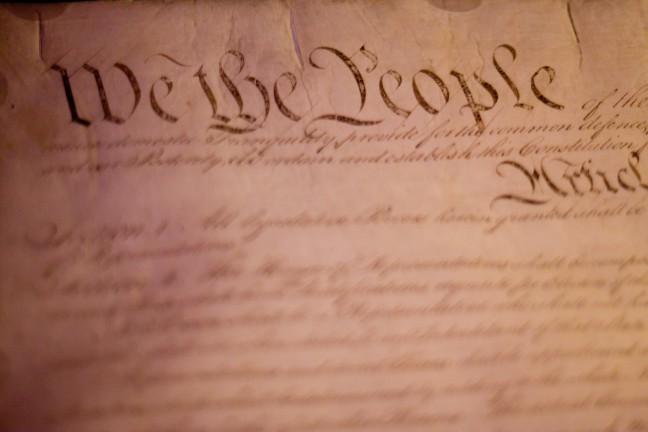Following passage of a joint State Senate resolution Tuesday, Wisconsin became the 28th state to call for a U.S. constitutional convention.
Earlier this year, the Wisconsin State Assembly passed a similar resolution.
As the resolutions have now passed both houses of the state Legislature, and as Governor Scott Walker’s approval is not needed, last night’s vote made Wisconsin’s call for a constitutional convention official.
The convention was called in support of a proposed amendment to the U.S. Constitution which would require the federal government to operate under a balanced budget.
Under Article V of the U.S. Constitution, a convention to amend the U.S. Constitution will be convened if two-thirds of the states pass resolutions calling for one.
Tuesday’s vote makes Wisconsin the 28th state to call for a constitutional convention, meaning only six more states are needed before the two-thirds threshold of 34 states is met.
The two-thirds threshold, however, only guarantees a constitutional convention will be held. In order for any amendment to be passed, three-fourths of the states must agree to it. This translates to 38 of the current 50 states.
The organization advocating for the proposed amendment, the Balanced Budget Amendment Task Force, enjoys strong support from Republicans nationwide.
This is highlighted by the fact Republicans control the legislatures of all 28 states who have called for constitutional amendments, with the exception of Colorado. In Colorado, Republicans only control the state’s Senate.
According to the BBATF website, Wisconsin was one of the states being targeted by the organization to pass such a resolution in 2017. Other states targeted this year include Washington, Idaho, Montana, Minnesota, Kentucky, Virginia, South Carolina and Maine.
The organization said Congress has no fiscal restraint, and is “bankrupting” the United States. According to a feature on their website which claims to calculate the national debt in real time, the United States currently maintains a national debt of more than $20 trillion.
Sen. David Craig, R-West Bend, supported the sentiments expressed by the organization, and said the U.S. has a “debt problem.”
Craig said it is time for legislatures throughout the United States to exercise the authority granted to them under Article V of the Constitution and to rein in the excesses of the federal government.
“It is time for the legislatures to act accordingly and to do the responsible thing — to put pressure on Congress, to put pressure on Washington, D.C.— and exercise our authority under Article V,” Craig said.
Senate Democrats, however, expressed reservations at the potential ramifications of convening a constitutional convention.
Sen. Fred Risser, D-Madison, said it’s unnecessary and potentially dangerous to hold a convention to amend the Constitution.
“This is a bill that is absolutely unnecessary and is dangerous,” Risser said. “It’s unnecessary because we have a document — the United States Constitution — which has lasted for several hundred years. It’s a great document, and I think it should be continued as is.”
Risser said there were other, less risky ways the government could go about balancing the budget without calling for a constitutional convention.
Sen. Kathleen Vinehout, D-Alma, expressed concern over the scope such a convention could take.
Once a constitutional convention is convened, Vinehout said any number of issues related to the U.S. Constitution could be amended, regardless of the express purpose for which the convention was called.
“There is no safeguard for what gets dealt with when this constitutional convention gets started,” Vinehout said.
The author of the bill, Sen. Chris Kapenga, R-Delafield, however, said the time for debate over the public debt is over.
Kapenga, who said he has been working on this legislation for months, claimed debt levels have risen too high, and people on both sides of the aisle agree action must be taken.
“The founders put this in place specifically for times when the federal government was not taking action when there’s severe risk,” Kapenga said. “There is no debate we’re in a severe territory.”
A constitutional convention has never been successfully convened in the more than 200-year history of the United States Constitution.
While there have been many attempts, particularly since the 1960s and 1970s, there has never been an instance where 34 states have called for a convention to held.


